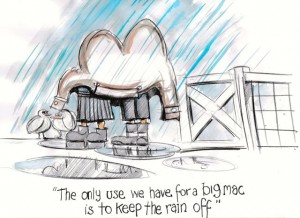Nuclear Families.
“A husband, a wife and some kids is not a family. It’s a terribly vulnerable survival unit.” (From “A Man Without a Country” Kurt Vonnegut 2005)
Up here on the Hill, the only use we have for a big Mac is to keep the rain off. If the mac is big enough it’ll keep the rain off two people, which can be… convenient. Of course there was the incident with the Major and Mrs Dumpleton, but it was a dark night and the Major’s eyesight is not what it was. Anyway, soon after that, the Major began bumping into the cake-laden widow when he least expected it. If nothing else this seemed to indicate that the widow’s eyesight was a lot better than the Major’s. The object of her affection’s obvious discomfiture amused everybody especially his efforts to avoid the enamoured Mrs D. The whole thing blew over when the widow’s patience abruptly gave out, and things settled down once more. The Major is of advanced years, basically harmless and only indulges his ‘hobby’ occasionally. Because of this we can look after him, keep him out of trouble. Sometimes we even get girls to feign hysterics, just to cheer him up, particularly if his birthday is coming up.
Oh, dear, this is always happening with me. It was my avowed intention, from the word go, to stick solely to the subject of William Cobbett. How the Major intervened in this is anybody’s guess but there is so much stuff goes on up here that it’s very easy to become confused.
Aha! Of course!
The following is an extract from a well-attended talk given by Major Tom Sebring;
“William Cobbett, the 18th Century English author of ‘Rural Rides’, hated London. He referred to it as ‘The Great Wen’, a wen being then a boil, a wart or a skin eruption. Cobbett, living during the period when the Industrial Revolution was gathering steam, not only witnessed the land being cleared of people, but watched entire ancient villages and towns being emptied and ploughed under in the name of ‘improvement’. He railed against the great industrial cities and their insatiable hunger for people. Cobbett knew that irrevocable damage was being done to the old way of life, that people were fleeing to the cities, straight into the arms of exploitation, disease and industrialised death. He wrote a book explaining precisely how a man might live a dignified life and raise a healthy family, in the country. He called it ‘Cottage Economy’. The book is still in print.”
The point the Major was making during this talk was that industrialisation destroyed families. Not, I think, families in the modern sense of Dad, Mum and a couple of kids. What Cobbett saw, and the Major is reminding us of, is that we have lost something which is almost incomprehensible to the modern, post industrial mind. Industrialisation destroyed the extended family. Extended families, according to the Major, can only begin to exist again if people stay in the same spot, put down long-time roots and set about ignoring the blandishments of the commercial world. The Major reckons we have, once again, the opportunity to do this. He reckons we should grab it with both hands.
Oh, the Major has promised us another talk on this subject. We are all looking forward to it with great interest. It’s to be called ‘The Commercial Nuclear Family.’

